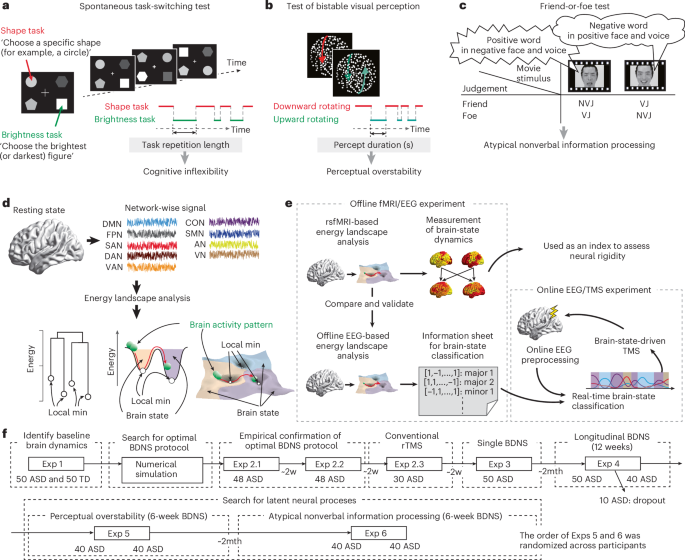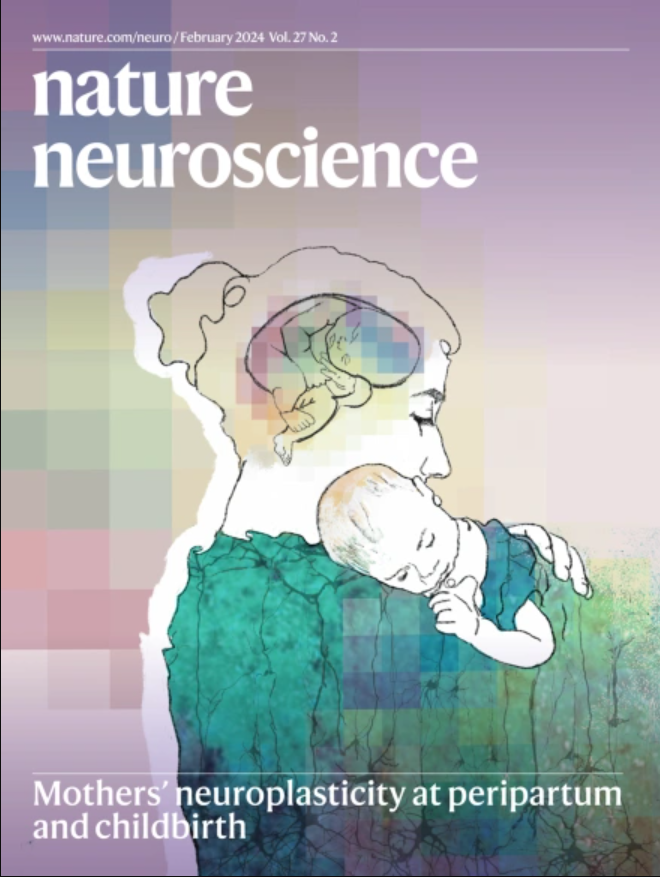Noninvasive reduction of neural rigidity alters autistic behaviors in humans
IF 20
1区 医学
Q1 NEUROSCIENCES
引用次数: 0
Abstract
Autistic behaviors correlate with reductions in specific brain-state transitions in global neural dynamics, implying that the mitigation of such rigid brain dynamics may alter autistic traits. To examine this possibility, we investigated longitudinal behavioral effects of state-dependent transcranial magnetic stimulation (TMS) in autistic adults. We found that excitatory TMS over the right parietal lobule decreased neural rigidity, which commensurately reduced social and nonsocial autistic behaviors. Specifically, TMS-induced neural flexibility immediately decreased cognitive inflexibility and slowly reduced overstable perception and atypical nonverbal communication. In particular, perceptual overstability was reduced after TMS-induced neural flexibility strengthened the coupling between the frontoparietal and visual networks, whereas atypical nonverbal communication became less explicit when the neural flexibility enhanced the coupling between the frontoparietal, default mode and salience networks. These results indicate that alteration of neural rigidity could change multiple autistic traits. Autism is associated with inflexibility of brain dynamics. Watanabe and Yamasue show that TMS over the right superior parietal lobule while the brain is ‘stuck’ in a certain state reduces this rigidity and relieves various autistic traits.


非侵入性的神经刚性降低改变了人类的自闭症行为
自闭症行为与全球神经动力学中特定脑状态转换的减少相关,这意味着这种刚性脑动力学的缓解可能会改变自闭症特征。为了检验这种可能性,我们研究了状态依赖性经颅磁刺激(TMS)对自闭症成人的纵向行为影响。我们发现,兴奋性经颅磁刺激对右侧顶叶的刺激会降低神经刚性,从而相应地减少社交和非社交自闭症行为。具体而言,经颅磁刺激诱导的神经灵活性立即降低了认知不灵活性,并缓慢减少了过度稳定的感知和非典型的非语言交流。特别是,当tms诱导的神经柔韧性增强了额顶叶网络和视觉网络之间的耦合后,知觉过度稳定得以减少,而当神经柔韧性增强了额顶叶网络、默认模式网络和显著性网络之间的耦合时,非典型非语言交际变得不那么明确。这些结果表明,神经刚性的改变可以改变自闭症的多种特征。
本文章由计算机程序翻译,如有差异,请以英文原文为准。
求助全文
约1分钟内获得全文
求助全文
来源期刊

Nature neuroscience
医学-神经科学
CiteScore
38.60
自引率
1.20%
发文量
212
审稿时长
1 months
期刊介绍:
Nature Neuroscience, a multidisciplinary journal, publishes papers of the utmost quality and significance across all realms of neuroscience. The editors welcome contributions spanning molecular, cellular, systems, and cognitive neuroscience, along with psychophysics, computational modeling, and nervous system disorders. While no area is off-limits, studies offering fundamental insights into nervous system function receive priority.
The journal offers high visibility to both readers and authors, fostering interdisciplinary communication and accessibility to a broad audience. It maintains high standards of copy editing and production, rigorous peer review, rapid publication, and operates independently from academic societies and other vested interests.
In addition to primary research, Nature Neuroscience features news and views, reviews, editorials, commentaries, perspectives, book reviews, and correspondence, aiming to serve as the voice of the global neuroscience community.
 求助内容:
求助内容: 应助结果提醒方式:
应助结果提醒方式:


